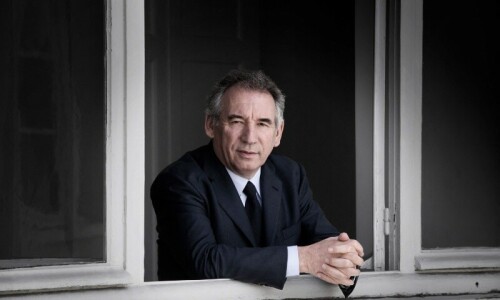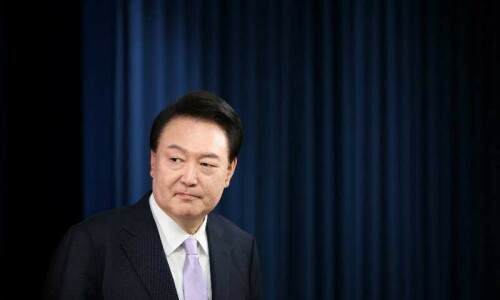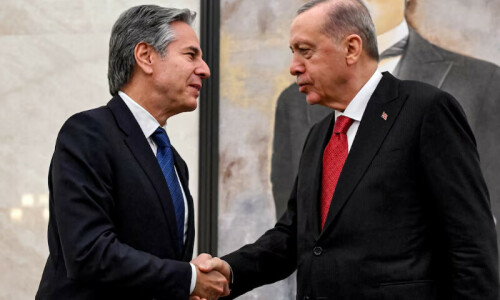
WHILE the actual alignment of political forces will be seen when a caretaker set-up is announced before the elections, one thing is for sure: the PPP needs to work out a clear strategy vis-à-vis nationalists in Sindh.
There are clear indicators that the nationalists are poised to make gains in parliamentary politics. From their point of view, Sindh needs an alternative and effective political leadership instead of the PPP. Thus they have staked their claims by vigorously raising issues important to Sindh such as the 1991 Water Apportionment Accord, the National Finance Commission Award, Greater Thal Canal (GTC), Kalabagh dam and the recent issue of the ‘Mohajir province’ as well as Zulfikarabad. It is also important to note that the nationalists are not comfortable with the PPP-MQM coalition.
Three mainstream nationalist parties — the Awami Tehrik (AT), Sindh Taraqqi Pasand Party (STP) and the Sindh United Party (SUP) are already part of an alliance, called the Sindh Progressive Nationalist Alliance (SPNA). It would be helpful to review the electoral history of the SPNA’s component parties.
AT’s Rasool Bakhsh Palejo had lost the 1988 polls on a National Assembly seat in Thatta. Since then the AT has not contested polls. The STP’s Dr Qadir Magsi could not win a provincial assembly seat in 1997 from Thatta, after which his party boycotted the 2002 elections. Again being part of the All Parties Democratic Movement (APDM), it stayed away from the 2008 polls. SUP leader Jalal Mehmood Shah did win a provincial assembly seat from Dadu in 1997 to become the Sindh Assembly’s deputy speaker.
The nationalists outside the SPNA fold like the Jeay Sindh Qaumi Mahaz (Bashir) and factions of the Jeay Sindh Mahaz have tended to stay away from electoral politics as they don’t believe in the present structure of the state. However, they are a big group if put together. Yet the fact that they are opposing the PPP government does not necessarily mean they would be willing to side with the PML-N.
It is pertinent to ask if the SPNA will last till the elections given recent developments. The SUP has a dialogue directly with the PML-N for an alliance. Also, the AT didn’t use the SPNA platform for holding its Mohabbat-i-Sindh rally in Karachi that was attacked on May 22.
The Sindh Assembly Speaker Nisar Khuro and Sindh Chief Minister Syed Qaim Ali Shah of the PPP have had working relationships with the nationalists, which developed over the issues of the Kalabagh dam and the GTC during the Musharraf regime. Both PPP leaders were instrumental in opposing these projects. Interestingly, though, it is during this PPP government’s — in limbo at the moment following the disqualification of the prime minister — tenure that the Indus River System Authority (Irsa) released water for the GTC through the controversial Chashma-Jhelum link canal.
Previously, Benazir Bhutto had led a big rally attended by nationalist parties in August 1998 on the Sindh-Punjab border at Kamoo Shaheed against the Kalabagh dam following an announcement by Nawaz Sharif regarding the proposed dam.
The issue of Zulfikarabad city has also generated an anti-PPP debate in Sindh, especially among nationalists and those planning to contest elections from Thatta. The project is being considered an attempt to convert the local population into a minority and to settle non-Sindhis there in the name of development.
Gone are the days when nationalist parties were branded the B-team of the PPP. People like Qadir Magsi have talked about snatching the electoral mandate from the PPP in the coming polls. Nawaz Sharif is also romancing the nationalists to neutralise PPP in its power base. His seems to be a tactical move — engage hard-line nationalists like Magsi and Palejo against the PPP on one hand and make inroads in Sindh on the other.
He has been hobnobbing with individual political figures of Sindh to bring them into the PML-N fold. It is in this backdrop that smaller groups or individuals like the Mahars of Ghotki, the Jatois of Naushero Feroze and the Shirazis of Thatta are working to hammer out details with the PML-F for a possible alliance. It is premature at this stage to predict if the PML-N will succeed in forming an electoral alliance with all nationalists who pursue parliamentary politics.
But Qadir Magsi is no mood to have any electoral alliance with any federal party and wants to fight it all alone. Also, Sindhi nationalists want to monitor Nawaz Sharif’s ‘political stability’. For Ayaz Latif Palejo Nawaz Sharif will become untrustworthy in Sindh for all times to come if he tries to side with the MQM come election time.
PPP insiders believe that this time Nawaz Sharif is playing the Sindh card by appealing to the nationalists’ rank and file and some powerful individuals. The party leaders feel there are some seats where the PPP wins by a lesser margin and any Sharif-nationalist-individual electoral combination may pose a challenge to the PPP’s electoral dominance in rural Sindh.
The PPP is trying to come up with an effective response on issues concerning Sindh. The people’s emotional attachment to the PPP, or to the Bhuttos rather, is deep in Sindh. President Asif Ali Zardari has been managing moves against his government at a crucial time quite well, to the surprise of many. Will the PPP capitalise on the Bhutto factor alone to retain its hold on Sindh, or will the nationalists make their electoral presence felt this time around? Only time will tell.
The writer is Dawn’s senior reporter in Hyderabad.












































